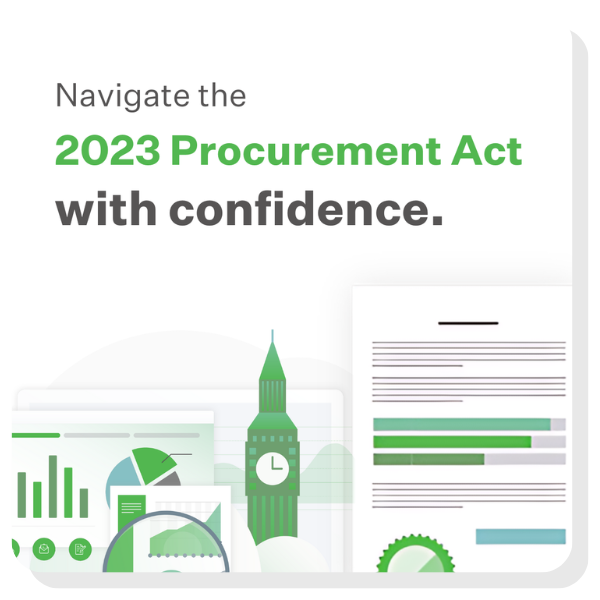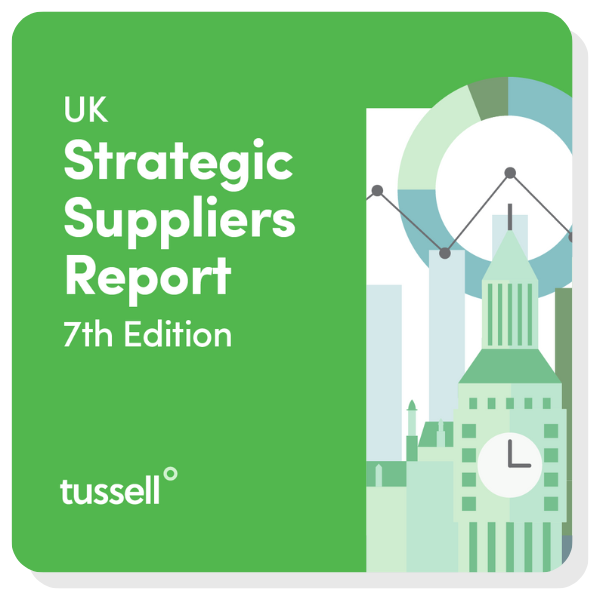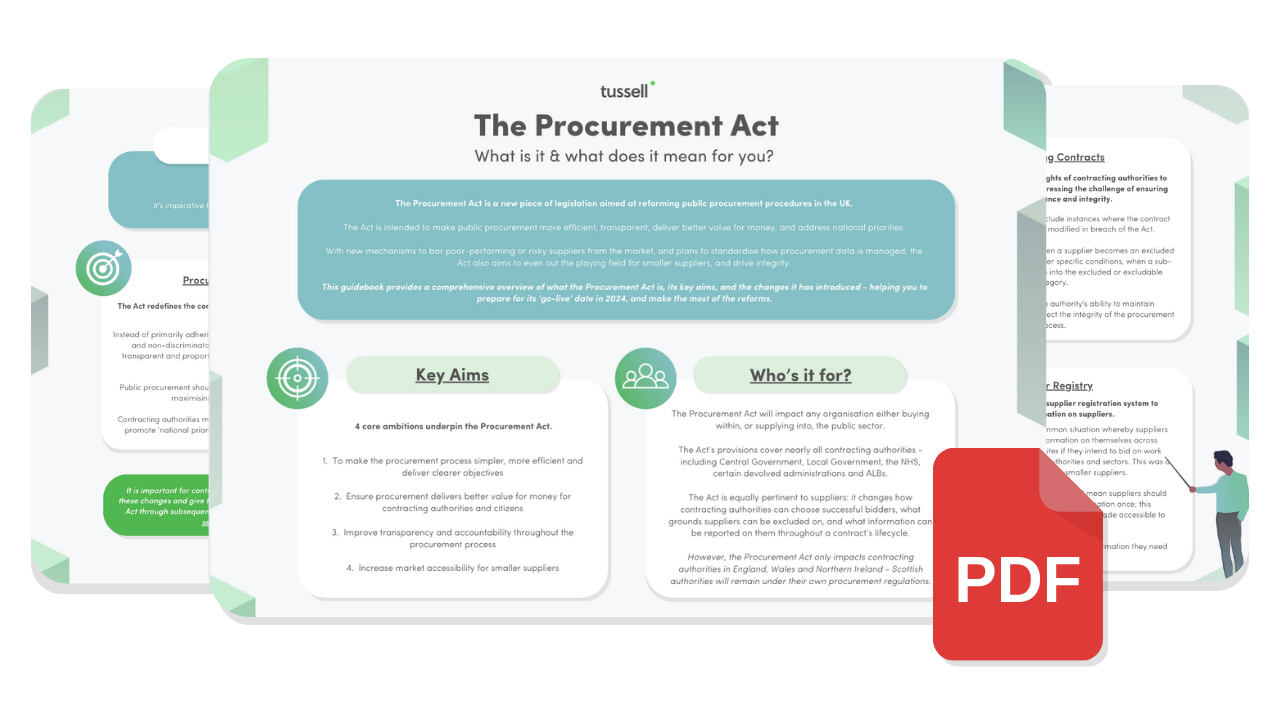One of the most significant areas of change to be brought about by the Procurement Act 2023 surrounds the questions of supplier debarment and exclusion.
When the Act goes live, new powers will be afforded to contracting authorities to exclude underperforming or otherwise ill-fitted suppliers.
This article takes a look at how supplier debarment and exclusion is set to work under the new administration.
Skip ahead to read about:
- What is supplier exclusion?
- What is the supplier Debarment List?
- How can suppliers prepare for the new exclusion and debarment rules?
- Conclusion
***
This article is part of a series of articles on the 2023 Procurement Act.
Head to Tussell's Procurement Act Hub for all the information and resources you need to get Procurement Act ready.
🤔 What is supplier exclusion?
The exclusion of suppliers by government is not a new concept.
The Procurement Act 2023 is set to expand on existing rules that allow public sector contracting authorities in England and Wales to exclude suppliers from the procurement process for a limited range of reasons.
Under the new legislation, contracting authorities are not obligated to consider a supplier's bid if the supplier or any 'connected person' meets specific grounds for supplier exclusion.
The concept of a 'connected person' includes:
-
Beneficial owner(s) of a supplier;
-
Directors and shadow directors of a supplier;
-
Parent or subsidiaries of a supplier.
This list is not exhaustive.
In line with previous legislation, the Procurement Act specifies a list of both mandatory and discretionary grounds for supplier exclusion.
In the case of private utilities, the usual mandatory grounds are to be treated as discretionary only.
❓ What are the grounds for supplier exclusion?
The grounds for supplier exclusion will remain largely unchanged by the Procurement Act 2023.
However, for the first time, the Act includes mandatory and discretionary grounds for supplier exclusion based on competition law infringements and national security interests.
The grounds for discretionary exclusion cover the following:
-
Bankruptcy, insolvency, or equivalent situations;
-
Convictions relating to significant actual or potential environmental impacts;
-
Professional misconduct, dishonesty, and impropriety;
-
Potential competition infringements;
-
Serious labour misconduct, even without conviction;
-
Poor performance on a previous contract or breach of a previous contract that was not remedied after the opportunity was given to do so;
-
Poor performance on a previous contract that led to contract termination and/or damages to have been awarded or a settlement to have been reached;
-
Instances where a supplier acts improperly in a procurement, thereby putting itself at an unfair advantage;
-
Instances where the supplier poses a risk to national security.
The grounds for mandatory exclusion cover:
-
Convictions for offences including (although not limited to): bribery, blackmail, organised crime, fraud, robbery, terrorism, money laundering, modern slavery, corporate manslaughter, corporate homicide, labour market offences and tax-related offences;
-
Been found by the CMA or another regulator to have participated in a cartel;
-
Been deemed a threat to national security;
-
Failed to provide information requested by the authority
These exclusion criteria apply to offences and misconduct committed both in the UK and abroad.
✋ What is the procedure for supplier exclusion?
In instances where a supplier is included on the supplier Debarment List, the supplier in question will almost always be automatically excluded in the procurement process.
However, when a supplier has not been debarred, a contracting authority must consider whether the supplier is continuing or likely to continue infractions when determining whether exclusionary grounds applies.
Before being excluded, suppliers must be given the opportunity to make representations and provide evidence that the infraction will not occur again.
The Procurement Act 2023 introduces an amended 'self-cleaning test', which suppliers may use to evidence the ways in which they have mitigated the risk of previous misconducts being repeated.
'Self-cleaning' may take the form of updating internal policy or introducing new training measures.
⚖️ How to appeal against exclusion
After being excluded from the procurement process, suppliers will maintain the right to challenge that decision (unless the supplier is on the centralised supplier Debarment List).
To challenge exclusion, the supplier would need to prove that the contracting authority unfairly applied the law or made an error in their decision to exclude.
📜 What is the supplier Debarment List?
The Procurement Act 2023 mandates the creation of the UK Government's centralised supplier Debarment List, which will be managed by the Cabinet Office.
As with all supplier exclusion, inclusion on the Debarment List may be based on either mandatory or discretionary grounds.
Generally, suppliers included on the mandatory Debarment List must be excluded from all procurement for a specified period of time.
However, when national security is cited as the reason for debarment, the Debarment List must specify which type of contracts the supplier is debarred from.
The supplier would then be permitted to bid for contracts that do not fall into this category.
For suppliers on the discretionary Debarment List, a contracting authority may voluntarily choose to exclude a debarred supplier from a particular procurement without:
-
Offering the supplier any opportunity to make representations
-
Notifying the supplier of the reason for their exclusion
However, if it is deemed that the decision to exclude a supplier from procurement was made irrationally, there may be grounds to challenge the decision before the court.
❓ What is the procedure for inclusion on the supplier Debarment List?
For a supplier to qualify for the supplier Debarment List, a government minister must have conducted an investigation and found that the supplier may be subject to exclusion.
During this investigation, the supplier will be given the opportunity to make representations in their defence.
If/when the minister decides the supplier must be debarred, the minister must notify the supplier of their finding.
At this point, an 8 working-day standstill period begins.
During this 8-day window, the supplier may issue legal proceedings for interim relief.
The Court will then have discretion as to whether or not entry onto the debarment list should be suspended pending the outcome of the supplier's appeal.
Once on the Debarment List, the supplier will have 30 days to launch an appeal against the debarment decision. However, there are limited grounds for such an appeal.
At any point whilst on the list, the supplier may petition to be removed if they believe that the necessary 'self-cleaning' has taken place.
🤔 How can suppliers prepare for the new exclusion and debarment rules?
The Procurement Act is set to go live on February 24th 2025.
To prepare, suppliers should seek to identify reasons why they may be considered excludable or eligible for debarment..
When investigating, it is important to consider the organisation as well as any 'connected persons'.
If any reasons can be identified, suppliers may choose to begin the 'self-cleaning' process.
For some suppliers, it may also prove helpful to keep an eye out for competitor infractions. These may be used as evidence when challenging future awards.
🌅 Conclusion
The Procurement Act significantly expands the scope of the supplier exclusion framework, making it easier for contracting authorities to exclude suppliers from procurement.
And, the new centralised Debarment List provides a formal process for supplier debarment.
However, how robustly these new exclusion and debarment powers are to be used remains to be seen.
Some suggest that increased powers to exclude suppliers on the basis of previous poor performance may incentivise suppliers to be more selective when choosing which contracts to bid on.
Thus, a side-effect of the new exclusion and debarment regime may be a reduction in time pressures for procurement teams.
* * *
The Procurement Act presents the biggest change to public procurement in almost 10 years - possibly even longer.
If you're worried about how the Procurement Act will affect your business you're not alone.
Tussell provides data-driven insights on the public sector market so that, no matter how the procurement landscape changes, you'll always be ahead on the top frameworks, upcoming opportunities and trends in your market.
Book a demo with the Tussell team to learn how you can start using data to drive sales, future-proof your business and de-risk your public sector strategy.
This article is part of a series of articles on the 2023 Procurement Act.
Head to Tussell's Procurement Act Hub for all the information and resources you need to get Procurement Act ready.
Sources:
Executive Compass, The Procurement Act 2023 – The Public Debarment List (Executive Compass, https://www.executivecompass.co.uk/blog/news/procurement-act-2023-the-public-debarment-list/)
Addleshaw Goddard, THE PROCUREMENT ACT 2023: DON'T PASS GO - THE NEW DEBARMENT REGIME (Addleshaw Goddard, https://www.addleshawgoddard.com/en/insights/insights-briefings/2022/public-procurement/the-procurement-bill-debarment-regime/)
Lawrence Accardi, Nick Pimlott, Supplier exclusion and debarment under the Procurement Act (FieldFisher, https://www.fieldfisher.com/en/insights/supplier-exclusion-and-debarment-under-the-procurement-act)
Osborne Clark, The new debarment regime for UK public procurement: how contracting authorities can avoid the pitfalls (Osborne Clark, https://www.osborneclarke.com/insights/new-debarment-regime-uk-public-procurement-how-contracting-authorities-can-avoid-pitfalls)












.png?width=815&height=200&name=TUSSELL_Demo_CTA_Banners%20(11).png)
.png?width=815&height=200&name=TUSSELL_Demo_CTA_Banners%20(12).png)
.png?width=815&height=200&name=TUSSELL_Demo_CTA_Banners%20(6).png)
-1.png?width=450&height=330&name=Procurement%20Act%20Hub%20Graphics%20(1)-1.png)


